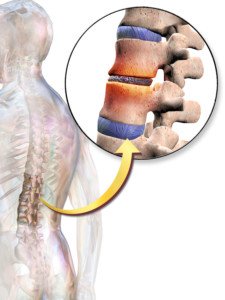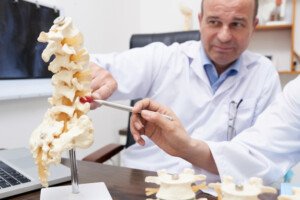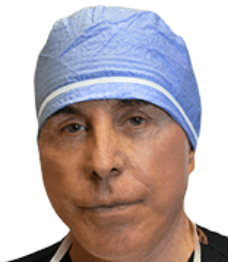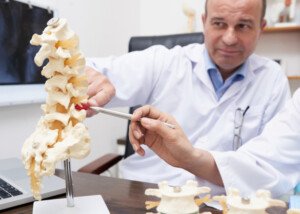The long term effects of an extruded or herniated disc vary depending on the degree of bulging out of the disc contents, or the leaking of the inner disc fluid into the spinal canal.
It really all depends on the symptoms that the patient has, says Alfred O. Bonati, MD, owner of The Bonati Institute, a world leader in advanced spine surgery, Hudson, FL.
By itself, an extruded (aka herniated) disc does not cause pain – as long as the disc material does not get into the spinal canal, where it can then make contact with a nerve.
Once the nerve is contacted, pain may result, along with weakness in the area that the nerve leads to and innervates, plus sometimes tingling/numbness and/or a pins and needles sensation.

Source: BruceBlaus
“If a disc fragment is pressing on the nerve, there are long term effects,” says Dr. Bonati. “A patient will be in the emergency room fast because they can barely move, and the pain is constant.
“If the disc is not pinching the nerve, it is not making pressure, so we may not need to treat the herniation. There may be occasional back pain or discomfort but nothing that requires surgical treatment.
“If a patient is maintaining symptoms of a herniation for a long time they may develop some stenotic [narrowing of the spinal canal] type symptoms that will need to be addressed later.”
A disc herniation is a very common occurrence in the general population.
Wear and tear on the vertebral discs through the mere act of living is the main cause, even though in many cases there are no symptoms.
The condition may show up on an MRI taken for an unrelated reason.
Water and protein content, that’s naturally in the spongy soft discs, declines over time, weakening the structures.
The discs become prone to tears through which the inner contents can seep through.
Conservative treatments for some patients are enough to manage the condition long term.
These include stretching, yoga, chiropractic manipulation, hot/cold compresses, exercise and over the counter pain drugs.
When these approaches have failed, then surgery becomes an option. Surgery to relieve the pain of a herniated disc is non-invasive and has a very high success rate.




























